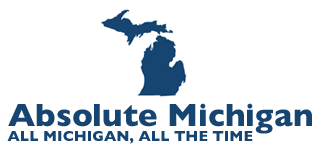Report from the 2009 Michigan Downtown Conference
Michigan downtowns, courtesy the photographers of the Absolute Michigan pool.
[iframe http://www.flickr.com/search/groups/show/?q=downtown&m=pool&s=int&w=70057581%40N00 500 375]
Today I’m at the Michigan Downtown Conference in Lansing. This morning I’ll be posting some updates from the conference as I’m able. This afternoon I’m on a panel with Julielyn Gibbons, Ryan Knott and Bigby Coffee co-founder Bob Fish, talking about new media marketing and promoting our downtowns.

capital evening by cmu chem prof
Downtown Lansing
Flash back to last night at 9 PM. I checked into the Radisson and then went out to walk around downtown Lansing. I spent some time talking to a guard at the city jail about the “vibe” downtown (or lack thereof). She said that when there are events, the area is humming but that on nights when there’s no planned festivities, it’s ghostly.
Over on Facebook, Bill Palladino noted that in his travels, state capitols are seldom (Austin TX, go get a drink of water) happening places. Richard pointed out several others that were doing well. In any case, I think there’s something a little sad about a city that is supposed to be the heart of Michigan with shuttered storefronts, perpetually torn up sidewalks and lack of life.
Dan Kildee, Keynote Speaker
“Our ability to make progress is determined in large part by our ability to work together”
Dan Kildee is the Genessee County Treasurer and director of the Genessee County Land Bank who has worked to use Michigan’s new foreclosure law for community development and neighborhood stabilization. He’s also pretty proud that he drew Rush Limbaugh’s ire for his plan to reduce the size of Flint (and ultimately cities across the country) to reduce their size and increase the ability to deliver services.
Dan notes that even in our terrible economy, it’s easier to build on a green field than to reinvest in our cities. He says that Michigan’s foreclosure system had a large role in creating our downtown problems by setting up a system that rewarded speculators. Now, he says, the system allows cities to treat urban land as if it has value and to apply community values and vision.
He had a very interesting talk in which he looked at the toolbox that is available to Michigan downtowns and some success stories from Flint including the redevelopment of the Durant Hotel in Flint as rental housing for students and young professionals. He notes that 70% of Michigan’s population lives on 8% of the land and that an overwhelming 97% of Michiganians feel that redevelopment in existing urban centers is preferable to building new. With a decent set of tools, he says all that’s missing is a bias on the part of lawmakers and our laws to support this pattern of development.
Lansing Mayor Virg Benaro asked us to close our eyes and imagine when the auto industry was in its heyday and how we built great cities during that time. Now, as the auto industry contracts we are still left with these great cities, but what are we doing to preserve and restore them. He then talked about how East Lansing and Lansing – two one horse towns driven by MSU and the Capitol could be 10 times the city if they worked together. He also called for cities and their surrounding communities to cooperate and build the brand of Lansing, Grand Rapids, Detroit and other cities.

Why Live in Detroit? by Derek Farr
Niche Marketing: Success through creativity and collaboration
A panel with Elissa Sangalli Hillary (Executive Director of Local First in Grand Rapids),
Claire Nelson (Co-Owner & Operator of the Bureau of Urban Living & cofounder (with Liz Blondy) of Open City Detroit) and Liz Blondy (Founder of Canine to Five Detroit Dog Daycare) talking about what they do and how small business can be a driver of vibrant downtowns.
Elissa noted a commonly cited statistic (view graphic) that shows 73% of dollars spent at a local business stay in the community as compared to 43% if you spend your money at a national chain. She discussed some strategies they are using to give small businesses access to pooled advertising and purchasing.
Claire talked about her small business and how Detroit offered an opportunity to start a business that would have been impossible in New York City where she moved from. She talked about the importance of creating a climate that’s business friendly and also – through events and collaboration – draws folks to burgeoning downtowns. She also drew a laugh by noting that small business in Detroit doesn’t face too many threats from national chain stores.
When Liz Blondy came on I lost wireless, making me again think that about the best thing a downtown can do is to deliver a free wireless cloud. She explained her philosophy of focusing on free networking and and promotional efforts rather than exclusively advertising. Small actions like referring waiting customers to another business to pass the time cost nothing and reap big rewards. Wireless is apparently back.


